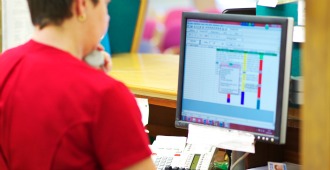The NHS needs to overcome ‘reticence’ about data sharing and embrace the ‘immense opportunities’ offered by artificial intelligence, according to a think-tank.
The Thinking on its Own: AI in the NHS report from the Reform think-tank said the use of AI such as chatbots, wearable devices, diagnostic tools and automated administration could help in self care, health prevention and saving resources.
Norman Lamb, who chairs the parliamentary science and technology committee, said AI offered ‘immense opportunities’ to transform health. It has ‘the potential to propel the health and social care system into the 21st century – improving care both in the hospital and at home, and making much more efficient use of resources.’
The current use of AI ‘was piecemeal and patchy’, said Reform. Early adopters include North Central London NHS CCGs’ trial of Babylon’s instant triage replacement for NHS 111.
However Reform acknowledged that ‘public confidence and trust are vital for the successful implementation of AI’.
The think-tank also said the NHS needed to ‘fully pursue efforts to digitise its data’ despite the reticence of some health professionals and patients about data sharing.
Fears over hacking contributed to a ‘lack of public trust’ on how data is stored and handled, it added.
Last year’s malicious WannaCry attack on the NHS affected a number of organisations, including 600 GP practices.
The authors noted that concerns include worries that data could be used for other reasons, data loss and inaccurate record keeping.
The report cited a 2014 IPSOS Mori survey for the Royal Statistical Society that said only 41% of patients trusted their GPs’ surgery to use their data appropriately and 35% trust the NHS.
There was also reticence about sharing information following the failure of the care.data scheme in 2016.
‘GPs were unsure over their legal responsibilities and this led to poor engagement,’ said Reform. It said there were ‘definite cultural barriers’ to risk adverse healthcare professionals and organisations sharing data.
The BMA said doctors had ‘serious concerns’ about a relaunch of the Department of Health and Social Care’s data sharing scheme next year which will extract and anonymise data from GP practices
Pulse October survey
Take our July 2025 survey to potentially win £1.000 worth of tokens














